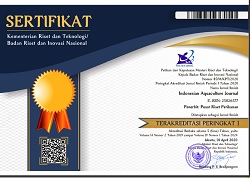PHENOTYPIC AND GENOTYPIC PERFORMANCES OF BLACK TIGER SHRIMP, Penaeus monodon HAVING FAST GROWTH TRAITS
Abstract
Shrimp breeding research focusing on fast growth traits is important to develop better phenotypic and genotypic characters of shrimp spawners. The aim of this research was to evaluate shrimp breeding technology to produce fry having fast growth traits. Selection was initiated from the breeding of wild shrimp spawners (F-0) based on full sib mating, probiotics, biosecurity, and viral diseases diagnosis. Viral disease diagnoses were performed using 7 viruses (TSV, WSSV, IHHNV, YHV, BP, MBV, and HPV) provided in the IQ-2000 kit. The result showed that 11 families of the first generation (F-1) shrimp were phenotypically varied (big, regular and small size). Number of fry from the first generation resulted from phenotypic selection that have fast growth trait ranged between 1.99% and 4.49% of the total fry population. Genotypic performance of the shrimp broodstock (F-0) and the first generation (F-1) showed different genetic variations. Heterozigosity values were 0.2872±0.0047 (female) and 0.5487±0.0103 (male) for shrimp broodstock (F-0), 0.704±0.0261 for the first generation (F-1) having fast growth trait, and 0.6224±0.023 for F-1 having slow growth. Gene markers of fast growth trait were indicated by the genes with molecular weights of 1,025; 1,280; and 1,325 basepairs and having different DNA sequences compared to that of slow growth shrimp.
Keywords
Full Text:
PDFDOI: http://dx.doi.org/10.15578/iaj.4.2.2009.101-108

Indonesian Aquaculture Journal is licensed under a Creative Commons Attribution-ShareAlike 4.0 International License.
















_25.jpg)


